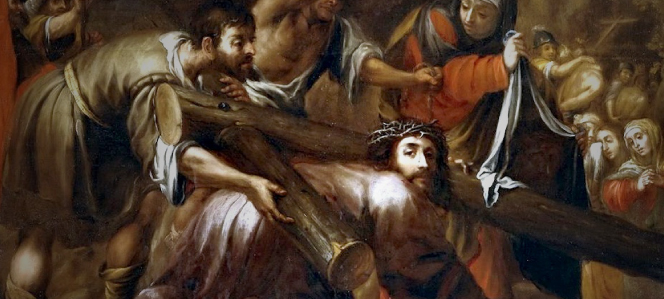The quality of mercy is not strained.
It droppeth as the gentle rain from heaven
Upon the place beneath. It is twice blest:
It blesseth him that gives and him that takes.
‘Tis mightiest in the mightiest; it becomes
The thronèd monarch better than his crown.
His scepter shows the force of temporal power,
The attribute to awe and majesty
Wherein doth sit the dread and fear of kings;
But mercy is above this sceptered sway.
It is enthronèd in the hearts of kings;
It is an attribute to God Himself;
And earthly power doth then show likest God’s
When mercy seasons justice. (Shakespeare)
During these days of trial in the Church and the world, when the failures of humanity seem to tower, it is now, above all, that Christians must show to the world “the quality of mercy.”
Mercy is not the absence of justice; it is the fusion of justice and love. Mercy is what love becomes when it meets injustice. Mercy is not soft or weak, but is infinitely more fierce and costly than justice alone. Justice alone condemns and contains, rages and seeks the punishment of the evildoer in order to bring justice the wronged. But justice wed to love for the persecuting, reviling, evildoing, hating, cursing enemy seeks restoration, redemption, and remedy for both victimizer and victim.
But mercy is infinitely more extreme than just “seeking” these things.
In Jesus the fusion of love and justice compels him to embrace the Father’s command to identify with the innocent victim and the guilty victimizer, to bear their burdens that both might be saved. In the Passion he drank our poison to become our antidote. This is what made him sweat blood and bargain with the Father in the Garden of Agony (Mk. 14:36). This:
For he was wounded for our transgressions,
crushed for our iniquities;
upon him was the punishment that made us whole,
and by his bruises we are healed. (Isaiah 53:5)
From the Cross, wholly identified with all innocent victims, Jesus pleads for the victimizers:
Father, forgive them; for they do not know what they are doing. (Lk. 23:24)
In fact, he identified with evildoers in the most radical sense imaginable:
For our sake he made him to be sin who knew no sin, so that in him we might become the righteousness of God. (2 Cor. 5:21)
Christ redeemed us from the curse of the law by becoming a curse for us—for it is written, “Cursed is everyone who hangs on a tree.” (Gal. 3:13)
St. Paul, having himself become Christ (Gal. 2:20), embraces this same terrible logic of mercy in response to his (Jewish) people’s rejection of the Messiah:
For I could wish that I myself were accursed and cut off from Christ for the sake of my own people, my kindred according to the flesh. (Rom 9:3)
In a most stunning passage from Pope Benedict, we see this explosive tension between justice and love erupts within God as a war:
God’s passionate love for his people—for humanity—is at the same time a forgiving love. It is so great that it turns God against himself, his love against his justice. Here Christians can see a dim prefigurement of the mystery of the Cross: so great is God’s love for man that by becoming man he follows him even into death, and so reconciles justice and love.
We who are in Christ, who have fallen deep into the paschal waters of Baptism, who dare sign ourselves with the Cross, who ingest the Food and Drink born of this war internal to God, must evince, must live out this same ethos of mercy. Seventy times seven times a day.
Whenever we embody this crazed love of our extremist God, “we proclaim Christ crucified, a stumbling block to Jews and foolishness to Gentiles” (1 Cor. 1:23).
The world outside of Christ either condemns or canonizes evil, but Christians carry evil—and evildoers—on their backs as a Cross (Lk. 9:23), by every means possible. By prayer and reparative penance, by fasting, by forgiveness, by alms or by charity-drenched fraternal correction. And in a million other merciful ways.
In fact, if we resolve to be tough and fierce in the face of evil as disciples of the Christ, with heroic courage, we must don those most fearsome weapons of the Cross that alone cause hell to shudder in terror. These were the same weapons with which the dead Christ harrowed hell’s infernal abyss. These are the weapons by which martyrs conquer evil.
Are we courageous enough to wield these weapons in these dark times? Let’s dare…
as God’s chosen ones, holy and beloved, to clothe yourselves with compassion, kindness, humility, meekness, and patience. Bear with one another and, if anyone has a complaint against another, forgive each other; just as the Lord has forgiven you, so you also must forgive. Above all, clothe yourselves with love, which binds everything together in perfect harmony. And let the peace of Christ rule in your hearts, to which indeed you were called in the one body. And be thankful.
